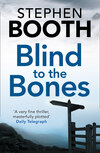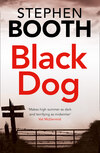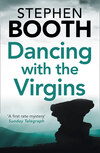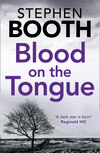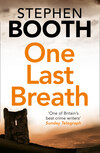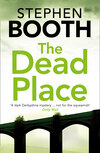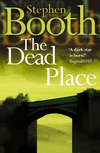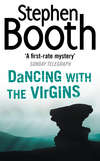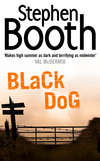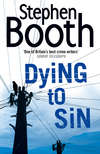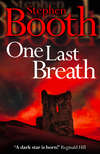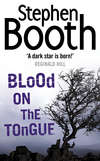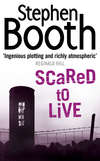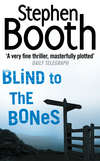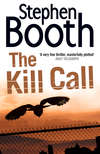Kitabı oku: «Blind to the Bones», sayfa 5
But Fry’s picture didn’t have the advantage of photographic permanence. It had been done with cheap paints. After a year or two, the colours had worn thin. They were scoured away by the rubbing of her hands, by her constant touching and stroking to make sure the picture was still intact. When she had handled her picture too often, the Breughel showed through again. That was when she had to go back for help, to prevent the faces of the tormented souls emerging once more from the red petals of the poppies, to convince herself that the hooves in the grass were those of cattle and not goat-footed demons. She needed reassurance to make her see the leaves of the clematis instead of the flames leaping from the pit. She needed help to see the innocence of the girl, not the scaly claws of the birds at her feet.
Each time she had to lay the paint on thicker, layer upon layer of it, with a bigger and bigger brush and in brighter and brighter colours. Finally, the picture had become so garish that she could no longer see anything but what lay underneath. She saw only blood in the poppies, and mould in the grass. She saw the bones under the skin of the girl.
6
Ben Cooper and Tracy Udall found the Reverend Derek Alton in his churchyard. He’d taken a bit of finding, because he was almost invisible among the weeds and overgrown shrubs. Alton was wearing wellingtons and corduroy trousers, and he was clutching a scythe in gloved hands. Thistle burrs and bramble thorns had stuck to his trousers. Now and then, he took a half-hearted swipe at the weeds, flattening them, but not cutting through them. In between swipes, he paused and stared gloomily at the plants.
‘I think your scythe needs sharpening,’ said Cooper.
Alton looked up and wiped his forehead with the back of one of his gloves. ‘Yes, I know. But the sharpening stone has gone missing.’
‘In fact, don’t you think that the job would be a lot easier with a decent brush cutter? You could hire a four-stroke model, so that you wouldn’t have to trail an extension lead all the way out here.’
Alton looked at the scythe dubiously, then down at his feet. Cooper saw that there was a gaping slash in the rubber across the toes of one of the vicar’s wellington boots. Perhaps a petrol-driven brush cutter wasn’t such a good idea after all – not if he could nearly take his toes off with a blunt hand scythe.
The church was small and stone-built. But it was a dark stone, almost black, unlike the golden sandstone or the almost white limestone that had been used in other areas. Maybe it hadn’t always been black, but had been stained by soot from the steam trains that had travelled on the railway lines below ground here.
PC Udall went to take a look at the vestry, where Mr Alton had reported the break-in.
‘Is it your turn on the rota for tidying up the churchyard then, Mr Alton?’ said Cooper.
‘Rota?’ Alton laughed. ‘I am the rota.’
‘Oh?’
‘Other churches have rotas. My other church, All Saints in Hey Bridge – that has a churchyard rota. The graves are tended wonderfully, and the parishioners don’t expect the vicar to lift a finger, let alone wield a scythe. Here in Withens, though … Well, they’re too busy to spare the time, I suppose.’
‘Who are your churchwardens here?’
‘Michael Dearden and Marion Oxley.’
‘I’ve heard of the Oxleys.’
‘Good for you.’
‘But who’s Mr Dearden?’
‘Shepley Head Lodge. It’s out past the village, that way.’
‘Right.’
‘They’re both very worthy people, but they have their own concerns, you see.’
‘Of course.’
‘The trouble is, when we get the first bit of sunshine in the spring, this is what happens.’
Cooper looked around at the undergrowth. There were gravestones somewhere in there, but it was difficult to be sure. Mats of rough grass had grown over the plots, and brambles and ivy had attached themselves to the stones, so that few of the inscriptions were decipherable. He realized he was standing on what had once been a flagged path, but the grass and dandelions had forced their way through between the flags and covered them. Burgeoning nature was out of control here, and it was spreading nearer and nearer to the church itself.
‘So you have no help at all?’ said Cooper.
‘A young man called Neil Granger is going to help me. At least, he said he was going to. He said he had one of those things you mentioned, a brush cutter, and some other tools. But he hasn’t turned up. I don’t suppose he could be bothered in the end.’ Alton sighed. ‘He’s always seemed a very genuine young man, but there we are. It’s the way of the world these days. Young people think nothing of letting others down.’
‘I don’t think that’s true,’ said Cooper.
Alton suddenly looked at him again, and smiled. ‘Good heavens, a policeman who doesn’t have a cynical view of humanity. Let me tell the curators of the folk museum in Glossop about you – they might want to preserve you for posterity.’
‘Young people always get a bad press. But I don’t think they’re any worse than they used to be, on the whole. We should put in a bit more effort, take an interest in what they’re doing, instead of writing them off.’
‘You make me feel positively ashamed,’ said Alton. ‘It should be part of my pastoral duties to draw the best out of the young people in my parish, not denigrate them. I’ll do my best to emulate your attitude.’
If it had been anyone else he was talking to, Cooper might have thought they were taking the mickey out of him. If it had been Diane Fry speaking the same words, they would have meant something quite different. But, strangely, the Reverend Alton seemed sincere.
‘Take an interest in them – that’s what you should do,’ said Cooper.
‘I will. Thank you.’
Cooper felt sure he was being patronizing. It was ridiculous to find himself lecturing a clergyman on showing an interest in his parishioners. But the vicar genuinely didn’t seem to mind. Probably he had received far blunter advice from his parishioners.
‘PC Udall tells me there have been some problems in the village with the children of the Oxley family.’
‘I’ve had to complain to their father a few times,’ said Alton. ‘They do tend to gather in the churchyard in the evenings – particularly at the back here, because it’s completely secluded and no one can see what they’re up to.’
‘And what are they up to?’
‘I shudder to think sometimes. I regularly pick up beer cans, and that kind of thing. They cause a bit of damage, and there’s some graffiti. It’s just a nuisance, really.’
‘But you find their father co-operative?’
‘Lucas? He listens. And so does Marion, of course. But I’m not sure how much control they have over some of the children.’
‘How many children are there?’
‘Oh,’ said Alton vaguely. He looked at the fingers of his gloves, as if he needed something to count on, but couldn’t find enough fingers. ‘There are so many of them down at Waterloo Terrace. Lucas has at least three sons – Scott is the eldest, and then there’s Ryan and Jake. And possibly Sean. Then there are a couple of married daughters. Well, one is married, but I don’t think Fran has ever bothered. And Lorraine and Stacey are the younger girls. But there are some cousins around, too, like Neil. He’s a Granger, but I think he’s Lucas Oxley’s nephew. It’s hard to keep track, you know – especially if you see them all in a group. Very often, I can’t sort out which is which, except for little Jake, of course.’
‘Jake – is he the one they call the Tiny Terror?’
‘Yes, poor boy. Now, I think Jake pays more attention to his grandfather than to his parents. That’s old Mr Oxley. It’s quite surprising, really, since Jake is only nine years old, and Eric must be about eighty. But perhaps Jake is going to take after his grandfather one day. We can but hope. Eric was a hard worker in his day, by all accounts.’
Cooper was having as much difficulty as Alton in counting the number of Oxleys. He had Lucas and Marion placed as the parents, but he’d already lost track of the number of children. Was it seven or eight? There were Scott, Ryan and Jake, but did Sean count? And how many cousins were there? Did the married daughters have children of their own? It was confusing enough, but now there was an older generation to take into account.
‘Is old Mr Oxley a member of your congregation here at St Asaph’s?’ he asked.
‘Sadly not.’
‘I’m surprised. I felt sure he would be. At his age, he would have been raised in the expectation that he would go to church every Sunday. Unless he’s a nonconformist, of course. There are a lot of Methodists in these parts.’
‘Wash your mouth out,’ said Alton, and smiled down at his scythe.
‘Is he a Methodist?’ asked Cooper.
‘I wouldn’t know,’ said the vicar. ‘I haven’t had the chance to ask him. Eric Oxley hasn’t spoken a word to me since I arrived in the village. Though I’ve passed him on the road several times and spoken to him, he’s never acknowledged me, never spoken to me at all.’
‘Not a word?’ said Cooper.
‘Not a word.’
‘Mr Alton, do you think the Oxley youngsters were responsible for breaking into your vestry?’
Alton sighed. ‘I really don’t know. They’re obvious suspects. But it’s a bit beyond what they normally get up to. They’ve never got inside the church before. There’s some quite serious damage to the doors and the furniture. And, of course, there are several items missing. They’ve never stolen things before.’
‘Some silver plate, I understand?’
‘Yes. Oh, they were nothing much, but they were the only things we have of any value at St Asaph’s. They were a gift from one of the founders, back in the 1850s.’
‘It’s quite possible we might be able to get them back.’
‘It’s kind of you to give me some hope.’
‘Not at all.’
‘If it turns out that it was the Oxley youngsters, what I really hope is that someone will find a way of halting their slide into criminality before it’s too late. The boys are getting older. Scott is quite a young man now, and so is one of his cousins. Glen, I think they call him. They’re not a good example for the younger ones. Sooner or later, something more serious is going to happen, and then an innocent person might get hurt. I wouldn’t want that to happen.’
‘I understand.’
Cooper looked at the flourishing undergrowth all around them in the churchyard. There ought to be flower borders under the church walls on either side of the porch, but instead the soil was hidden under elder saplings and clumps of ladies’ bedstraw. Later in the year, there would be a good crop of blackberries from the brambles covering the vestry. And it wasn’t even the beginning of May. At this rate, the church would have vanished completely by July.
Alton followed his gaze, and sighed again.
‘Are the words “losing battle” hovering on your lips?’ he said.
‘Something like that,’ said Cooper. ‘Or is it “Fight the good fight with all thy might”?’
Alton intoned: ‘“Lay hold on life, and it shall be; Thy joy and crown eternally.”’ He swung the scythe as he sang, and Cooper warily took a pace back. He saw that Alton had unintentionally beheaded a clump of dandelions. Their yellow petals fell at Cooper’s feet, like tiny shards of spring sun.
The vicar seemed to see the petals, too. ‘Fight the good fight,’ he said. ‘The darkness and the light.’
While PC Udall went to call in to see if the suspects were ready for interviewing, Ben Cooper tried to identify Waterloo Terrace, where the Oxley family lived.
There weren’t many places to choose from. Apart from the church, the pub, and the farms, there were a few detached homes and a little crescent of bungalows. But beyond the car park and below the road, Cooper could see a roofline and a series of brick chimney pots, just visible behind a thick screen of sycamores and chestnut trees. He began to wander towards it, intending only to take a look at the place.
Without the presence of any troublesome youngsters, Withens seemed eerily silent. There was no traffic on the road through the village, and it was protected from the noise of the A628 by the black humps of the peat moors in between. Cooper could hear only two sounds. One was the harsh cacophony of calls from a flock of rooks somewhere in the trees below the road. The other was the equally harsh, but higher-pitched, voice of a petrol-driven chainsaw.
To get to the houses that he could see, he had to pass the entrance to one of the farms. He paused at the farm gate and looked down through a jumble of buildings. Near the gate was an ancient stone barn with narrow, unglazed windows like arrow slits. Further from the road, the buildings were more recent, and a tractor was parked in the space between them. Cooper found he was looking downhill through a tunnel of buildings to a spectacular view of heather-covered slopes in the distance. The dark mass of Bleaklow lay directly across the valley.
He moved on a few yards, sticking to the grass verge because there were no pavements and the edges of the road were starting to crumble. There were streams of small stones at the roadside that had been swept down by the water running off the hills. Here and there, scraps of black plastic from torn silage bags lay like tattered oil slicks on the verges.
In Withens, water seemed to run wherever it chose. At this moment, it was running directly into the entrance to Waterloo Terrace. Because the terrace was on the downhill side of the road, the water was draining towards it in large quantities. And it had been doing so for some time, judging by the holes scoured in the surface of the track leading down to the terrace. Cooper had to step over vast, muddy puddles to reach the safety of drier ground.
In the wide entrance, there were gate posts, but no gate hung between them. Ceramic drainage pipes had been stacked in neat, geometric shapes nearby, so perhaps someone was thinking of putting proper drainage in one day. Horseshoes had been turned upside down and nailed to the gate posts – they were ready to catch luck or trap the Devil, whichever folklore you chose to believe.
There was nothing about Waterloo Terrace that resembled the romantic idea of a holiday cottage in the Peak District. There were no mullioned windows, no rose-filled front gardens, no honeysuckle growing on the walls. The eight houses were built of black brick that had weathered badly. It had become discoloured and was beginning to crumble at the exposed edges. Between each pair of houses, Cooper could see the arched mouth of a narrow passageway that ran towards the back of the terrace. The passages were completely enclosed and must run underneath the front bedrooms.
He stood where he could see into one of the passageways, and he could make out no light at the end of the brick tunnel. The passage seemed to turn a sharp corner at the far end, maybe providing access to a back yard, and all he could see was a blank wall. The builders hadn’t thought to install lights in these passages, either.
There was a sudden crack like a gunshot in the air above the rooftops. But it was only a couple of wood pigeons taking off, their wings clapping loudly as they accelerated and performed a circuit of the houses.
Waterloo Terrace puzzled Cooper. It stuck out like a sore thumb in this area, where all the buildings were built in the traditional style, from local stone. Gritstone was so plentiful on the hills all around here that it was difficult to imagine why anyone should have decided to use brick. And black brick at that.
In front of the row of houses there was a long stretch of garden that had been converted to growing vegetables at some time. But the effort had been abandoned, and weeds had been allowed to take over where the earth had been disturbed. There were a few sickly cabbages gradually being smothered by thistles and couch grass. Cooper wasn’t surprised by that. Withens was surely one of those places where the wind was strong enough to blow cabbages clean out of the ground – and not just during the winter, either.
Only in one part of the garden had the weeds been held at bay – and that was because black plastic sheeting had been laid over the earth. It was held down by stones and a variety of rusted metal objects that looked as though they had been lying around somewhere waiting for a useful purpose to be found for them. The plastic had torn in a few places, and strips of it flapped lazily in the breeze. The soil under there would be warm and weed-free, and full of worms and insects. But would anything actually be growing?
Across the track from the terrace stood a row of brick privies, with bright blue doors and sloping roofs of stone tiles overgrown with grass and moss. The iron hinges of the doors had been replaced several times, leaving their marks in the paintwork. And now the old privies were padlocked and unused.
Cooper walked on a bit further. The track felt gritty underfoot. The water running down it towards the road had washed away whatever surface had been there originally, leaving a wide channel between banks of grass splashed with dirty water. The wheel ruts of some heavy vehicle had worn through the remaining layer of grit in places to expose the hardcore underneath. Some of it was broken black bricks – presumably what was left over after Waterloo Terrace had been built, or perhaps the remains of some other buildings that had been demolished.
The rookery he had heard was in the chestnuts beyond the track. The birds were setting up a noisy accompaniment to his progress along the front gates of the terrace gardens. The overgrown gardens looked damper than they should have been, even after the morning’s showers. In fact, they looked impossibly wet – the peaty soil was waterlogged and washed away in places. No wonder the cabbages weren’t flourishing. Rice might have been a better crop to plant here. Presumably the water cascading off the hillsides ran straight through the gardens, too.
Cooper must have been tired, or lulled into inattention by the silence. He had lost awareness of his surroundings, and was taken completely by surprise when he heard the voice.
‘Don’t come any further, or you’ll regret it.’
7
Diane Fry and Gavin Murfin had arrived outside a modern office building made of steel, concrete blocks and aluminium cladding. It stood in the middle of a business park on the southern outskirts of Edendale, constructed on what had once been the flood plain of the River Eden.
‘This is it,’ said Murfin. ‘Eden Valley Software Solutions. Have you seen all that smoked glass and fancy furniture? It looks like a brothel.’
‘You must know some high-class brothels in Edendale,’ said Fry.
‘OK. A hairdresser’s, then.’
As Murfin got out of the car, Fry glanced suspiciously at a paper bag he had left on the ledge over the fascia.
‘What’s in the bag, Gavin?’ she said.
‘Don’t worry. It’s for later,’ he said.
‘Much later, I hope.’
Fry had taken her Peugeot to be valeted only two days before, and it was largely because she could no longer stand the debris left by Gavin Murfin when he had been a passenger. There had been crumbs and sticky traces of all kinds ground into her carpet and upholstery. In fact, the man at the valeting company had asked her how many children she had. He had imagined her to be a mum who got lumbered with a car full of whining toddlers on the nursery school run every day. It had been embarrassing, and it was Murfin’s fault.
As soon as they announced themselves at Eden Valley Software Solutions, Alex Dearden emerged from a corridor to meet them in the reception area. He was wearing black jeans and a black T-shirt with a designer logo on it that was so small Fry would have had to rest her nose on his left nipple to read it. Dearden’s face was slim and fine-boned, but his looks were spoiled by two little pouches at the sides of his mouth, which made him look a bit like an angry hamster. His beard might have disguised the effect, except that current fashion dictated he could only have a goatee.
‘You have to sign in and get ID badges,’ said Dearden. ‘Sorry about that. Security, you know.’
‘That’s quite all right, sir,’ said Fry. ‘We’re lucky that you’re open at all on a Saturday.’
‘Oh, it’s seven days a week for some of us here at the moment.’
When they had signed in, Dearden went to a solid-looking door and stood with his back carefully turned towards them as he keyed numbers into a keypad. The door clicked, and he pulled it open. A burst of noise came down the corridor – voices talking and laughing, someone shouting, a printer humming.
‘It’s just like going into our custody suite back at the station,’ said Murfin. ‘I guess they don’t want your inmates escaping and running amok on the streets either?’
Dearden laughed politely. ‘Actually, we’re thinking of switching over to fingerprint-recognition technology,’ he said. ‘Much more secure. Code numbers are too easy to get hold of.’
‘Absolutely. We can’t fault you for your security measures.’
‘You have to be careful,’ said Dearden. ‘There’s a lot of crime about.’
‘Have you ever had any problem with break-ins here?’
‘Actually, no. We had a bit of vandalism a while ago. Somebody broke the window in the front of reception. We’ve had reinforced glass put in since then. They scrawled graffiti on the outside wall, too. Something about Manchester United FC, all spelled wrong.’
‘That doesn’t sound like Edendale’s gang of notorious computer software thieves, anyway.’
Dearden stopped. ‘My God, who are they?’
‘Just joking,’ said Fry. But she saw that Dearden wasn’t amused.
‘There’s an awful lot of money tied up in what we’re developing here,’ he said. ‘Unbelievable amounts of money. There’s no way of calculating how much.’
‘I’m sorry, sir.’
‘You don’t appreciate what we’re developing here. It’s really ground-breaking stuff. If we roll some of these programs out for all platforms –’
‘There’s no need to explain,’ said Fry. ‘That wasn’t what we came about.’
But Dearden wanted to explain. Or at least, he wanted to talk about a subject that had nothing to do with a visit by the police.
‘We’ve actually used top consultant psychologists in the development of this concept,’ said Dearden. ‘That’s how serious we are about it.’
‘Mmm.’
Dearden had led them down the corridor and into a small conference room, where there was a long table, a flipchart on a stand, and a projection screen against the end wall. It looked like a million other meeting rooms that Fry had been in for briefings and training sessions. She looked around for an overhead projector to go with the screen. But of course presentations here would be done in PowerPoint from someone’s laptop.
To her surprise, Alex Dearden sat at the head of the table as if he were about to chair a meeting. Fry had expected to be facing him across the table. This way suited her, though. It meant she and Murfin could be on either side of him. Dearden couldn’t concentrate on both of them at once.
‘It’s about Emma Renshaw,’ said Fry, taking a chair.
‘Emma? But that’s a long time ago,’ said Dearden. ‘It was all dealt with a long time ago.’
‘It wasn’t exactly dealt with, sir. Emma has never been found.’
‘Of course, I know that. And it’s been very distressing for all of us who knew her.’
‘Yes, sir.’
‘But, I mean, I told the police everything I knew at the time, which wasn’t very much. It was all gone through over and over, though it didn’t do any good. Tragic though it is for her family, I think there comes a point when we have to put these things behind us and move on, don’t you?’
Fry stared at him. She had to remind herself how old Alex Dearden was. Twenty-two, according to his file. But he sounded like someone thirty years older. He sounded like a respectable middle-aged citizen irritated at being pestered over something that had happened long ago in his past, when he had been a different person entirely.
‘You knew Emma from a very young age, I believe,’ said Fry.
‘For ever. We lived in the same village. In Withens. Do you know it at all?’
‘I haven’t been there yet.’
‘Well, when you see it, you’ll understand. There’s nothing to the place. Children of around the same age couldn’t help but know each other. We went to the same junior school, in Tintwistle. And later on, to the same secondary school, too. But our parents were on friendly terms anyway, so we were thrown together a lot.’
‘And after school, you even ended up going to the same university.’
‘No,’ said Dearden. ‘You have that wrong. I went to Birmingham University. Emma was at UCE, where she attended the art school. That’s the University of Central England. It’s a former polytechnic.’
‘Right.’ Fry looked at Alex Dearden and saw the little superior smile. He thought he had the better of her now, and was feeling more relaxed.
‘But our universities were close enough that we thought it might be a good idea to pitch in together and rent a house,’ he said. ‘It beats being thrown in with a load of strangers. You don’t know who you’re going to have to live with for three or four years when you do that. It’s madness. At least I knew Emma wouldn’t be too much trouble. And our parents thought it was a good idea, too. They put the money up front for the deposit, of course.’
‘Of course,’ said Fry. She had never been to university herself, and had never had any parents either willing or able to put the money up to rent a house for her. But she nodded and smiled to encourage him.
‘And your other housemates – one was Neil Granger.’
‘Ah, well, he’s a bit of an odd character, is Neil.’
‘Odd?’
‘Well, don’t get me wrong. He’s OK really. But he didn’t mix with us so much back in Withens, you know, because he was one of the Oxleys.’
‘I’m sorry? Could you explain?’
Dearden shifted on his seat and his smile faded. He glanced at Gavin Murfin, unnerved by the silent one, as they always were.
‘You’ll have to find out about the Oxleys,’ said Dearden. ‘They’re a bit of a rough lot, always in trouble. We never normally had anything to do with them. Actually, I thought you would know of them already – they’ve all got criminal records, of course.’
He looked at Murfin again, who stared back at him blankly, in the way that only Murfin could. Holding his gaze, Murfin began to work his jaws a bit, as if he were chewing gum. But Fry knew that he hated gum. He said it was like going out with a prick-teaser – it promised to be food, but never was.
She looked down at the notes she’d brought. ‘I think I have heard the name Oxley, now you mention it,’ she said.
Dearden looked relieved. He was on safe ground again, talking to people who were on the same wavelength. He was uncomfortable about his attitude to the Oxleys, and he didn’t like having to justify himself. Fry filed away that piece of information for future reference.
‘Neil Granger is some kind of cousin of the Oxleys,’ said Dearden. ‘There’s Neil and his brother Philip, and they were brought up with the Oxleys. But he’s a decent enough bloke, Neil. When you’re talking to him, you can forget he’s an Oxley.’
‘He was at the same school with you and Emma? In the same class?’
‘Yes.’
‘And which university did he go to? Birmingham or Central England?’ She shuffled her papers. ‘I’m afraid I don’t seem to have that information, either.’
Fry looked at Alex Dearden with a hopeful expression, and was pleased to see the complacent smile was back.
‘Neither,’ he said. ‘Neil wasn’t at uni.’
‘But he shared this house with you in, where was it, Bearwood? Why did he go all that way to share a house? I don’t understand.’
‘It was a bit of a coincidence, really. At first, when we went down there, it was just the three of us – me, Emma and her friend Debbie, who was on the same course. The two girls were big pals, you know, and they went everywhere together. But there was a fourth bedroom in the house, and after a while we started to think we’d have to try to find someone else to share. To be honest, the rent was a bit of a struggle for the three of us. You don’t appreciate what expenses you’re going to have, you know – books and all that. Emma and Debbie had a lot of equipment to buy for their course work.’
‘And there would be socializing, I suppose?’ said Fry.
Dearden looked at her suspiciously. ‘Why do you suppose that?’
‘Well – student life. There’s a lot of socializing, isn’t there? Or so I’m told.’
‘A bit. But if you have any sense, you don’t go mad. Not if you want to get through your course with good grades, which we all did.’
‘I see. But life was proving a bit expensive, all the same?’
‘Yes. Things we hadn’t budgeted for – Council Tax, electricity, the phone bill. You know.’
‘Yes, I do know.’
‘Anyway, it was around then that Neil got in touch. He said he had a job to go to in Birmingham. It was a two-year contract on a development project on the inner ring road, as I remember. Neil wanted to know if we’d let him rent the other room in the house. Our parents weren’t too happy, but we talked about it between us, and we decided to go for it.’
‘Because he was somebody you knew, rather than a stranger?’
Dearden hesitated. ‘Well, the thing that really swung it was the salary he was earning. He was getting good money on this contract, and the rest of us were just students living on loans. So we thought he’d be useful.’
Fry wanted to do something to remove that smile now, but she needed to keep Alex Dearden on her side. Out of the corner of her eye, she noticed Murfin chewing more quickly, as if he had found something with an unpleasant taste in his mouth that he wanted to spit out.
